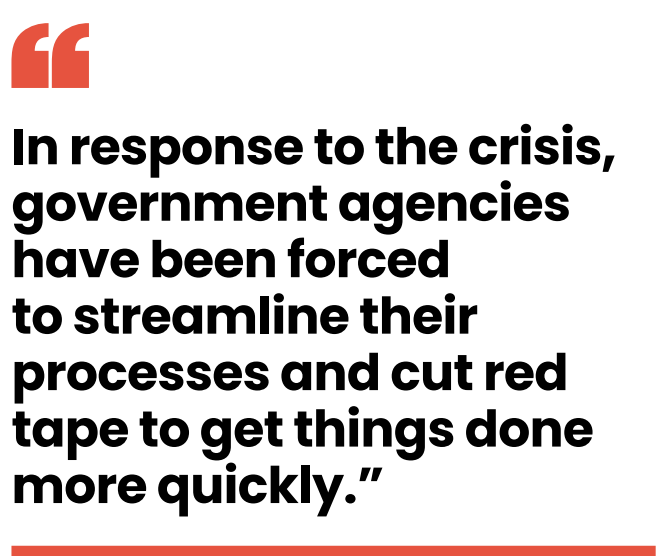Leaner and Stronger Government Vital for Post Pandemic New World
In a constantly developing country like Malaysia, government agencies must collaborate closely to continue serving the people's needs

As the world begins to emerge from the pandemic, governments will be looking to review and capitalise on many of the changes that have been introduced.
The pandemic has forced many businesses to close their doors, but it has also led to a boom in online activity.
As more people work from home, there is less need for brick-and-mortar office space. This can be true for government servants too, who can now perform their duties from virtually anywhere. The pandemic has shown that there is no need for large, expensive office buildings.
In the face of a global pandemic, even government bureaucrats have had to adapt and change how they work.
For years, government servants have been accused of slow and deliberate pace, seemingly immune to time and efficiency pressures. However, the COVID-19 pandemic has forced even the most resistant government employees to reevaluate their methods. In response to the crisis, government agencies have been forced to streamline their processes and cut red tape to get things done more quickly.
This culture shift has proved that government bureaucracy can be nimble when necessary, eliminating red tape without compromising quality or service. As we continue to grapple with the pandemic, this new government culture will likely become the norm rather than the exception.
Smaller government workforce
While it may seem counterintuitive, a smaller government workforce can increase efficiency and effectiveness.
There are currently estimated over 1.7 million civil servants in Malaysia, equivalent to almost 10% of the total workforce. This is significantly higher than the OECD average of 5%.
About 62% out of 1.7 million are employed in the health and education sectors and the military and police, with the balance comprising employees from the administration, social services, engineering, economic and science sectors, among others.
Not only does this large government workforce come at a high cost, but it also leads to inefficiencies and effort duplication. Experts reckon Malaysian taxpayers can expect to pay RM184 billion for emoluments and RM63.9 billion for pensions a year by 2027.
Having fewer civil servants would not only save money, but it would also allow government agencies to focus on their core functions. In addition, a leaner workforce would be more agile and better able to adapt to changing circumstances.
Overlapping roles
On the business end, in a rapidly developing country like Malaysia, government agencies must work together efficiently to best serve the needs of the people. But unfortunately, experts say, this is not always the case, as there is often overlap between the different agencies’ roles.
This overlapping makes it difficult for them to coordinate their efforts and leads to duplication of services. As a result, the Malaysian government needs to streamline its agencies and improve coordination to spur innovation and digitalisation efforts.
Michael Warren, CEO of Consulting Board Asia, says: “It’s often been mentioned that Malaysia has too many government agencies and ministries.
"This bloated workforce has contributed to a substantially larger than required draw of finances from the government and taxpayers to feed excess needs.”
Business end
What is more concerning to Warren is that Malaysia’s investment climate is challenging for companies looking to invest, further impacted by the current post-pandemic repercussions.
The lack of clear guidelines and information about how the government agencies work makes it difficult, if not impossible, as investors are just guessing who will give them the correct information.
Warren said: “Companies that know how to navigate this maze do so almost as an art form, often being led by whom they know instead of what they need, and they end up playing the government agencies against each other.”
While there was a discussion about shutting down a bunch of overlapping agencies at one stage, he notes that it takes guts, discipline, and political willpower to make this happen.
“In the absence of this, the better model would be to have one generic streamlined top-down driven government empowered body, cutting across all ministries, with national dashboard target executing KPIs and SLAs tied to powers to slash budgets (and manpower) of underperforming government agencies quarterly.
“And a second similar generic empowered body must also be formed for the digital and innovation efforts. We should place all the economic corridors and government agencies under these two entities and task them with downsizing the bloated government. This would create clarity for investors and reduce financial and taxpayer spending.”

Multiplicity of effort
Bobby Varanasi, CEO of Matryzel Consulting, agrees that there is a range of agencies spread across the economic sector.
He says: “More often than not, they have been independently pursuing sectoral or ministerial goals, leading to a multiplicity of effort, repeated mistakes, and distributed value – all of them combined leading to reduced effectiveness.
Collaboration is a must, particularly in today’s times when individual and organisational data is fungible across the board, as also useful for cross-leverage.”
Varanasi believes that by removing information silos through open data platforms, cross-ministerial or sectoral teams (policy and implementation) and ensuring the security of fungibility, we can make highly effective innovations. Additionally, this would lead to easing in delivery and increasing adaptability for changes that need quick adjustments when needed most.

As more people work from home, there is less need for brick-and-mortar office space.





